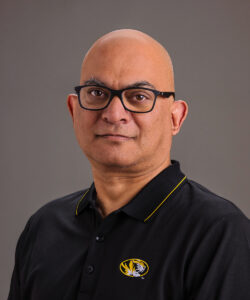Speakers: Paul de Figueiredo, PhD
 Paul de Figueiredo, PhD
Paul de Figueiredo, PhD
NextGen Precision Health Endowed Professor
Professor, Department of Molecular Microbiology and Immunology
University of Missouri
Paul de Figueiredo, Ph.D., is the NextGen Precision Health Endowed Professor in the Dept. Molecular Microbiology and Immunology and the Bond Life Sciences Center, University of Missouri School of Medicine. He has expertise in microbiology, host-pathogen interactions, and biotechnology development. He has led/co-led projects sponsored by DARPA, ARPA-H, NIH, NSF, USDA, and the Bill & Melinda Gates Foundation, and founded several biotech start-ups based on his work.
Microbial Medicines for Addressing Human Disease
For more than 150 years, it has been appreciated that various microbes possess therapeutic and immune-protective activities. However, many microbial-based medical strategies were abandoned due to poor efficacy, safety, or both, and replaced with chemo or protein therapeutics. Despite a long history of successes, these therapeutic modalities have substantial drawbacks, including limited efficacy against many types of diseases, including solid tumors, metastatic cancers, and autoimmune diseases. Moreover, live bacterial vaccines that protect against diseases of global consequence, including diarrheal diseases, antibiotic-resistant infections, and brucellosis, have not yet been realized. The development of next-generation microbial therapeutics and vaccines, especially “synthetic,” “programmable” microbes – developed using state-of-the-art synthetic biological approaches – constitutes an attractive avenue for addressing otherwise intractable human and animal diseases. In addition, the development of next-generation systems for the high throughput screening, scale-up, and manufacturing of microbial therapeutics provides unique opportunities for pursuing high-impact, cross-disciplinary (e.g., engineering & life science) collaborations. The presentation will highlight these opportunities and challenges.
